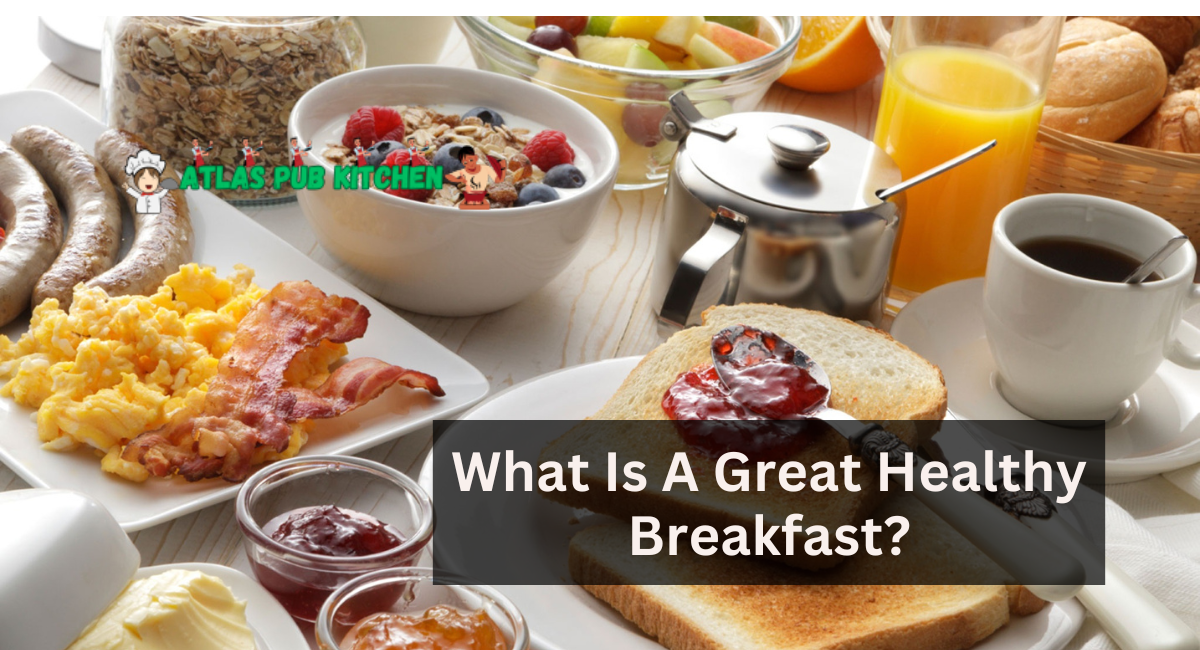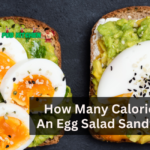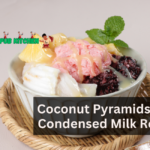A nutritious breakfast is the cornerstone of a vibrant and energetic start to the day. This meal sets the tone for our overall health by providing vital nutrients and energy to jumpstart the metabolism. An excellent healthy breakfast consists of a well-balanced combination of proteins, whole grains, healthy fats, and fruits or vegetables, ensuring a nutritious and wholesome start to the day.
In this article, we will examine the components of a healthy breakfast and the various options available to accommodate a wide range of dietary preferences and lifestyles.
What Is A Great Healthy Breakfast?
Breakfast is an excellent method to begin the day. A nourishing brunch can provide sustained energy and keep you satisfied for hours. A nutritious breakfast is typically rich in fiber, protein, healthy lipids, and micronutrients.
Here are 11 of the most delicious morning dishes and beverages:-
1. Eggs
Eggs are a straightforward and nutritious breakfast option. They supply the necessary protein for muscle growth and maintenance. Additionally, it can keep you content.
People who consumed eggs and toast for breakfast reported significantly less appetite than those who consumed bran cereal, indicating that the higher protein intake — 25 grams versus 11 grams — promoted greater satiety.
In addition, the egg group consumed fewer calories at lunch, indicating that eggs promote satiety — the feeling of content — which can aid in weight management.
Lutein and zeaxanthin are two vitamins that are found in egg yolk. They seem to help keep eyes healthy and may have other benefits as well. For healthy skin, liver, eyes, and heart, trust this source.
Choline is an important source of vitamin B12. It’s a Good Source of Information on Brain and Liver Health B vitamins, such as folate, vitamin A, iron, calcium, and other important chemicals
Contrary to what most people think, eggs do not raise cholesterol levels in most people, even though they contain a lot of it. There is some evidence to suggest that they may help protect against heart disease.
Along with your eggs, eat healthy foods like whole grain toast, fresh fruit, or veggies cooked in butter.
Eggs are rich in protein and several essential nutrients. They may promote satiety and help lower calorie intake later in the day.
2. Greek Yogurt
Greek yogurt is an excellent breakfast option. It is produced by straining whey and other liquids from milk curds, resulting in a protein-rich, creamier product than conventional yogurt.
Additionally, it contains fewer calories than many other protein sources. A serving of 1 cup (245 grams) contains 25 grams of protein but only 149 calories.
Other nutrients present in Greek yogurt are Calcium, Vitamin B12, potassium, and manganese zinc. Certain varieties contain digestive-supporting probiotics such as Bifidobacteria.
If you prefer a product that is even creamier and higher in protein, Icelandic yogurt, also known as skyr, is an excellent alternative.
Adding berries and other fruits to Greek yogurt may enhance its prebiotic or probiotic properties. Adding dried fruit, oatmeal, or nuts as a topping can contribute fiber and other nutrients.
In addition to being high in protein and low in calories, specific varieties of Greek yogurt are also rich in probiotics, which promote digestive health.
3. Caffeine
Coffee contains caffeine, which promotes alertness, enhances mood, and increases physical and mental performance.
It may also contain a variety of antioxidant and anti-inflammatory polyphenols. Most adults can safely consume up to three cups (710 ml) of coffee daily or 400 mg of caffeine.
Caffeine consumption during pregnancy should not exceed 200 mg daily, as it may increase the risk of complications.
Your coffee can be consumed plain or with dairy or plant-based milk. Avoid or use sugar sparingly, as excessive sugar consumption is associated with health risks. Caffeine in coffee enhances physical and mental performance by promoting alertness.
4. Quinoa
Oatmeal is made from grains that have been rolled or steel-cut. It contains beta-glucan, a soluble fiber that can help reduce cholesterol and glucose levels, and has antioxidant and probiotic properties.
Due to how the body processes oats, they will also keep you feeling fuller for longer, reducing the desire to nibble in the middle of the morning.
Oats also supply vitamins, iron minerals, manganese, magnesium, selenium, and zinc
Additionally, they contain approximately 10 grams (g) of protein per cup (81 g) of dried oats. To increase the protein content, prepare oatmeal with milk rather than water, add protein powder, or serve it with eggs.
Alternately, make homemade muesli by combining raw cereals with dried fruit, nuts, seeds, coconut, and other ingredients.
Oats are suitable for individuals with celiac disease or gluten sensitivity, but you should choose certified gluten-free oats due to the risk of cross-contamination.
Beta-glucan, a fiber found in abundance in oats, may reduce cholesterol levels and increase feelings of fullness.
5. Chia Grains
Chia seeds are an excellent fiber source. One ounce (28 grams) of desiccated chia seeds from Reliable Source contains nearly 10 grams of fiber.
This fiber is also soluble, which means it absorbs water and reduces the volume of food moving through the digestive tract, resulting in a prolonged feeling of fullness.
Among other benefits, the nutrients in chia seeds may aid in glucose management, cholesterol reduction, and inflammation prevention. Combining chia seeds with Greek yogurt, cottage cheese, or a protein smoothie, as in the recipe below, can increase your protein intake.
Chia seeds have a lot of fiber, which may help you feel full and less hungry.
6. Berries
Blueberries, raspberries, strawberries, and blackberries are all tasty berries that are also high in vitamins. They make a tasty snack that is usually low in calories and high in fiber.
Berries are also colored blue, purple, and red because they have vitamins in them called anthocyanins. Anthocyanins may help protect against inflammation, heart disease, cancer, diabetes, and other long-term illnesses.
Combine berries with Greek yogurt, cottage cheese, oatmeal, chia pudding, or a fruit smoothie for a delicious brunch. Berries are low in calories and high in fiber. They are also abundant in antioxidants, which may reduce your disease risk.
7. Cheddar Cheese
Cottage cheese is a high protein breakfast item, providing 24 gTrusted Source of protein per cup (220 g). Consequently, it is also satisfying.
Only 180 calories of cottage cheese are contained in each cup (220 grams). This means that it may promote weight loss without causing hunger. Cottage cheese can be eaten with various nutritious foods, including berries, apricots, tomatoes, cucumbers, chia seeds, flaxseeds, and granola.
Cottage cheese is high in protein, which may aid in satiety and appetite suppression. Common garnishes for breakfast include fresh fruit, vegetables, seeds, and granola.
8. Whole Grain Bread
This toast is rich in fiber and complex carbohydrates. These digest slowly, help you feel satisfied for longer and are less likely to raise blood sugar levels than breads or pastries made with white flour.
Toast made with whole wheat is an excellent source of fiber. Additionally, it can be topped with a variety of nutritious condiments. Nuts All nuts contain magnesium, potassium, heart-healthy monounsaturated oil, and antioxidants.
Their protein, lipid, and fiber content also contributes to their ability to promote satiety and manage weight.
As long as you don’t have a nut allergy, eating nuts and seeds every day may lower your risk of heart disease and other health problems. Nuts are typically high in calories, so consuming too many could result in weight gain. Additionally, it is ideal to use nuts without added salt, sugar, or oil, as these ingredients may be unhealthy.
Adding chopped nuts to Greek yogurt, cottage cheese, or oatmeal is an excellent method to increase the nutritional value of your breakfast. Nuts are a filling and nutrient-dense food that may lower your risk of heart disease and make your brain healthier.
9. Green Tea
Green tea is a refreshing beverage to consume in the morning. It contains approximately half as much caffeine as coffee.
It also contains L-theanine, a stabilizing agent that may reduce the “jitters” associated with caffeine consumption. Additionally, it may enhance mood and reduce anxiety.
Lastly, green tea contains epigallocatechin gallate (EGCG), an antioxidant that may aid in preventing neurodegenerative diseases such as dementia and cell death.
10. Protein-Rich Beverages
Smoothies are another delicious option for brunch. Blend water, dairy, or non-dairy milk with almonds, bananas, frozen berries, or other fruits and vegetables for a delicious morning beverage.
By adding protein powder, the protein content can be increased. This smoothie-protein shake combination can aid in satiety and reduce appetite while providing a delicious and nutritionally balanced breakfast.
Exercising first thing in the morning may be a better option than a hearty brunch. Making and transporting a protein beverage or smoothie in a few minutes is simple. In addition, this straightforward breakfast is an excellent post-workout meal.
11. Fruits
Fruits are an option for a light breakfast, and some whole fruits can serve as a transportable nibble.
All fruits contain fiber, vitamins, minerals, and simple carbohydrates and are relatively low in calories. Fruit’s fiber slows the body’s assimilation of its sugars, providing a steady energy source.
Other potassium-rich fruits include bananas, oranges, cantaloupe, papaya, and mango.
Many fruits, including oranges, strawberries, papaya, acerola cherries, and lychee, are rich in vitamin C, an essential antioxidant for skin health.
Depending on their color, fruits also provide a variety of polyphenol compounds and antioxidants. For example, guava is rich in lycopene, whereas plums are rich in anthocyanins. Eating a range of fruits of various colors can help increase your intake of a range of antioxidants.
What Are The Healthiest Options For Breakfast?
Good breakfast food selections will be nutrient-dense and satiating to protect you for a while. Try whole fruits, eggs, whole-grain toast, almonds, and smoothies for a delicious and filling morning meal.
What Is A Nutrient Brunch For Weight Loss?
Eating foods high in protein, fiber, or both can help you feel fuller for longer, reducing your desire for harmful morning snacks.
High protein options include cottage cheese, yogurt, and eggs. Complement these with nutritious, high-fiber foods like whole-grain bread, oatmeal, and fruit. Choose water, green tea, or coffee without sugar or milk for a beverage.
Which Breakfast Dishes Should I Avoid?
Avoid foods high in calories but lacking in nutrients and fiber. This includes cereals, pastries, and white toast prepared with white flour and sugar. They are high in calories and won’t keep you satisfied for long.
Other highly processed foods, such as bacon and sausages, are fatty and difficult to ingest. Many commercially produced beverages contain added sugar. Make your beverage or consume whole fruits.
A nutritious breakfast can help you get a decent start on the day and prevent you from snacking and gaining weight. Foods rich in fiber, protein, healthy lipids, vitamins, and minerals are the best options for satiety and overall health. Many nutritious, healthy foods and drinks are also simple to prepare in the morning, for instance, whole grain toast, eggs, green tea, coffee, and protein shakes. If you don’t have time for breakfast, you can consume certain foods on the go, such as fruit.
Thanks for reading.










